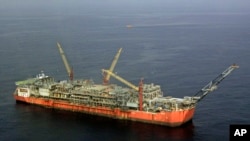In Nigeria, Shell oil company is under fire once again after Amnesty International publicized court documents saying the company under-reported the size of two 2008 oil spills in the Niger Delta.
Since 2011, Shell has been fighting a lawsuit by 15,000 people affected by a pair of oil spills that occurred near the village of Bodo in the oil-producing Niger Delta region.
New court documents published by Amnesty International this week show that the oil company understated the size of the 2008 spills.
Amnesty says they also show the company knew some of its pipelines in the Niger Delta were old and prone to failure.
Audrey Gaughran is the director for global issues at Amnesty International.
“Shell has admitted that it’s underestimated the volume of oil spilled in both spills and the impact of both. Which is a very significant issue, because they’ve denied that for years. People have given them evidence that they were underestimating their damages repeatedly. The second thing that emerged in these court documents is that Shell has known for years that the pipes going through the Ogoniland area were past their reasonable use-by dates, were old, leaky and in the words of the document 'a hazard'. And this has come from internal Shell documents that show they knew how bad these pipes were," said Gaughran.
Shell did not respond to request for an interview with Voice of America.
However, in a statement, the company said it initially estimated that the spills released 4,144 barrels of oil, but later found out that the amount of oil spilled was higher.
While Shell did not give an estimate of how much oil was released, Amnesty said their investigation found over 100,000 barrels were spilled in the first accident alone.
Gaughran said the discrepancy undermines Shell claims that it thoroughly investigates any spills.
“They have relied on these oil spill investigations that they have been doing for years. And they’ve told the world, this is what happens in the Niger Delta, trust us, these are our oil spill investigations. [It’s these] oil spill investigations that they’ve now had to admit contain erroneous data, and data that underestimated both the volume of oil spilled and the impact, and the Bodo community are only one of many communities affected by this," said Gaughran.
Shell also denied that its pipelines were faulty, claiming that sabotage was the main cause of most of the spills in its operations in Nigeria.
Gaughran rejected that idea, saying that the company has overplayed the threat of sabotage.
“The claims that Shell is making about sabotage and theft are based on the very same oil spill investigations that Shell has now had to admit, at least in these two Bodo cases, aren’t even correct. So, Shell’s claims about theft and sabotage, issues that do occur in the Delta, but it tends to blame far more on those than we believe is really the case. It overplays it for PR purposes," she said.
More filings are expected on the case, which is being heard in high court in London.






